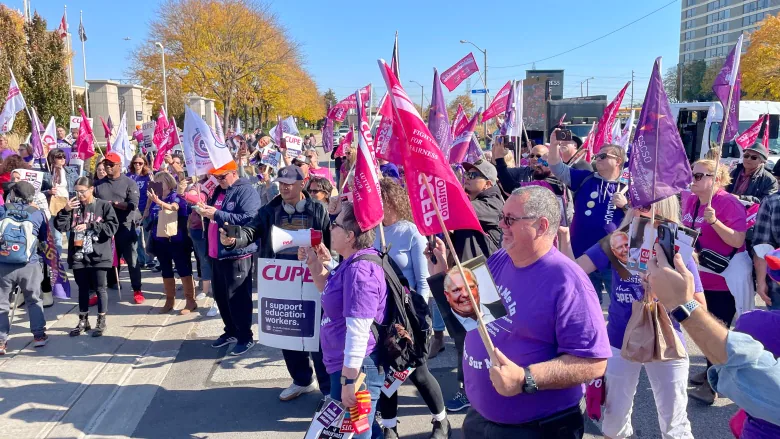CBC News
Op-ed: Students can be angry about the strike, but not about CUPE
November 21, 2022
As all students in the TDSB know by now, CUPE, or the Canadian Union of Public Employees, went on strike on Friday, November 4th, and seemed poised to do so again. The union is fighting for underpaid school board workers like custodians, office staff, and educational assistants. The Ford government passed a bill that made it illegal for CUPE workers to strike in an attempt to keep us in schools but offered to rescind the bill if CUPE employees went back to work. This means that the strike is described by CUPE as a “walkout in protest of the legislation,” since a “strike” under the bill wouldn’t have been legal. Currently, CUPE and the Ministry of Education have reached a tentative agreement, and CUPE members will have to vote on whether or not to ratify the government’s proposed deal. If they ratify it, students will stay in school. If they choose not to, they will continue to strike while the union and the government negotiate.
Students, as well as our parents and teachers, are finding it annoying and inconvenient that this strike may force us to go back to online schooling. Personally, my science class had a field trip canceled twice because of the strike, and I remember hearing a student complain “It would have been so much more convenient if it was next week.” Though it makes sense to be angry that an event we were excited about was postponed, it doesn’t make sense for students to unfairly direct that anger at the union’s choice to strike. Striking is a necessary tool for labor rights, and was never supposed to be “convenient.” It should not be taken for granted that the Ford government passed legislation taking away this vital right.
The negotiations between CUPE and the government are mainly over wages. Specifically, CUPE is asking for a wage increase of $3.25 an hour. Under the tentative agreement, the Ministry of Education is offering a flat-rate $1 raise for CUPE education workers. The average CUPE employee makes $39,000 a year, which is not enough to live on, explaining why 91% say they have had to deal with financial hardship and 51% have needed to work a second job. Raise caps set in place by the Ministry of Education have made it so that CUPE workers’ wages increase at a rate significantly less than current inflation levels. Additionally, education is one of the most feminized types of labor, with women making up 70% of CUPE workers. Ford’s government all but stated that CUPE workers are essential when they put a bill in place to try and force them back to work. If these workers are necessary to our education, how can the government justify paying them under the living wage? If students are looking for someone to be mad at, we should be mad at the government for underpaying the people who play an important role in ensuring they have a safe and supportive educational environment.

